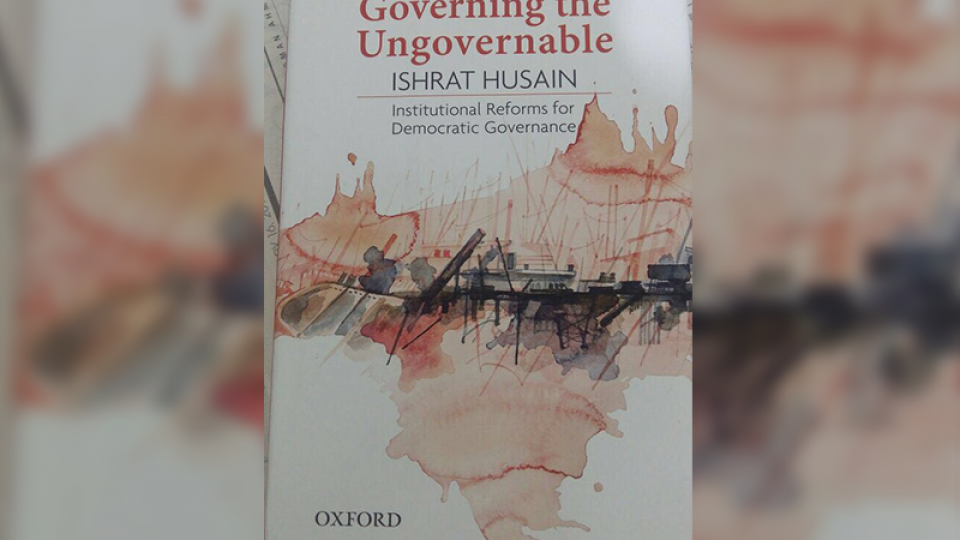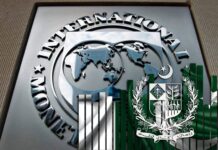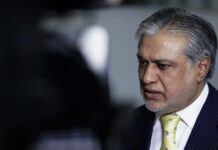Interview: Dr. Ishrat Hussain Former Governor, SBP
Having served two back-to-back terms as SBP governor in Pervez Musharraf’s dispensation, Dr Ishrat Hussain has had a long and distinguished stint in various high-profile leadership roles here and abroad – including with multilateral donor agencies. His absolute sweep of the economy, especially Pakistan’s, makes him the person to talk to when the country is purportedly going through difficult times – an attribute that given the prevailing economic crisis makes him a frontrunner for the interim prime minister’s position.
As the curtain inexorably comes down on the latest term of the PML-N dispensation, with 2018 national elections looming, the [previous] federal finance minister Ishaq Dar is being painted in colours not so flattering by many a top economist, with the charge sheet against him lengthy and damning.
In this milieu, Dr Ishrat Husain gives a thumbs-up to the finance minister reviled by an overwhelming majority of experts not belonging to the PML-N.
The Oxford University Press recently published Dr Husain’s latest book, the result of year-long research at Woodrow Wilson in Washington, ‘Governing the Ungovernable: Institutional Reforms for Democratic Governance’ suggests across-the-board reform in a whole raft of sectors. The one good thing about Ishrat Hussain is that he does not shy away from offering an opinion, hence, Profit spoke to him at length on the factors holding back Pakistan’s economic growth, foreign exchange reserves taking a plunge, devaluation and devolution, the CPEC, diminishing exports and surging imports etc.
Asked as to how he would compare the post-Musharraf 10 years to the 1990s, called ‘the Lost Decade’, he said, it ought to be divided into two parts. “Between 2008-13, the economic management was not given due importance, evident from five finance ministers and as many state bank governors. Without firm hands on the wheel, you cannot carry the economy forward. From 2014-17, the economy was in firm hands.”
Dr Husain bucks the trend, backing Dar to the hilt. “He managed the economy quite well until 2017. Under him, the upward trajectory was resumed. The criticism here is always lopsided. When are not having any growth, [experts complain] stabilisation is stifling growth. When now there’s growth, everybody is still critical of our current account deficit.”
To Dr Husain, the drop in exports from $25 billion to $21billion – which exacerbated the current account imbalance – was owing to energy shortages from 2010 to 2014, less so in 2015-16. “Had the growth rate stayed as in the past, by end 2018 fiscal, the exports would have been $36 billion – and trade deficit lower by $15 billion and [as a consequence] less borrowing. The culprit in this whole equation is the decline in exports, caused by energy shortages.

“For the last eight months exports though have increased by 11% cumulatively and in February they increased by 15%. It shows that the moment energy shortages were taken care of, the exports started picking up.”
Opt for growth:
Increase in investment too has precipitated the current account deficit. “Higher investment will take you to higher growth, but with a time lag. Meanwhile, to maintain a certain level of reserves, the difference between inflows and outflows needs to be borrowed. That is why $2.5 billion was borrowed, and another $2-3 billion would be needed to maintain reserves at $12.5 billion – equivalent to three months of imports. This is manageable. Growth should not be sacrificed, for after a long time we have a 5-6% growth trajectory. If I have to maintain the tradeoff between the current account imbalance and the growth of 6%, I would opt for the latter. That is my philosophy.”
“Growth is essential for the businesses and ordinary citizens, and for the absorption of 1-1.5 million of youth entering the labour force. Growth is good for taxation too, as the GDP increases and you retain the tax rate ratio, your taxes still go up. So, for all these reasons, if I have to maintain the tradeoff between the current account imbalance and the growth of 6%, I would opt for the latter. That is my philosophy.”
But will the government be able to tide over this current account gap? To him, it is a question of managing the economy. “We’re currently in turbulent waters and a good helmsman is needed. I don’t know, for how many months you didn’t have a finance minister in this country. There was a gap, and, hence, the uncertainty. International investors actually want to see who is running the show. The advisor [Miftah Ismail] is very competent but he is only there for 2-3 months. It’s a self-inflicted wound on economic management.”

Talking of self-inflicted wounds, in the late 1990s, the foreign currency accounts of resident and non-resident Pakistanis worth $11.2 billion were frozen, seriously denting the confidence of depositors. Is a repeat nigh? Dr Husain does not think so. “These accounts only hold $6 billion and the SBP is using that for forward swaps anyway. It would largely shake the confidence in the economy and doesn’t make any economic sense either.”
From the early to mid-2000s, how did he manage the SBP to have a decent stable exchange rate and good reserves? “We created an environment where FDI reached $5 billion, exports doubled during the 5-year period, remittances rose from below $1 billion to $6-7 billion. With such inflows, my problem was how to sterilise the excess dollars so that the rupee doesn’t get undervalued and hurt the economy – a very different problem than being faced today.”
What is the downside today? “Well, you have to protect your exports, you have to increase your remittances and you have to bring in more FDI. These are three no debt creating inflows. In my six years [as SBP governor], I only concentrated on that. My door was open for every exporter. Importers were not allowed to come but exporters were always welcome. I used to ask them what their issues were? And there are so many issues within the government, I honestly don’t know how people who do business in Pakistan continue to run them… Now, as the provincial government is doing its own thing, and no one bothers to ask the federal ministries of commerce or finance, there is more confusion. The FBR is at its strongest right now. And the day the FBR becomes strong, your industry and exports vanish. We are an over-regulated and overtaxed economy. That is the downside.”

The rupee has devalued sharply in recent weeks. Is it the right time for it? Dr Husain say, it is. “Also the fiscal deficit, $85 billion foreign debt means that your rupee liability goes up by Rs85 billion for one rupee devaluation. And that puts pressure on his fiscal deficit. Ishaq Dar calculated this much better but all the economists were against him. Now they are against the devaluation.”
Was he in favour of devaluation? Now? “The bottomline is only the central bank knows… where the inflows are coming from and when the outflows are going out and when there is going to be a gap. Even the finance minister should not talk about devaluation. Ishaq Dar used to have strong opinions about exchange rate. But the only entity that should speak about it is the SBP.”
IMF, no panacea:
As far as meeting the external commitments with current account deficit putting the reserves under pressure is concerned, Dr Husain believes that finance ministry would be able to manage that. “In the short-term it is going to be difficult but it can surely be managed. At the end, it would play out better for the country. It is a matter of making choices and these are tough choices. If you are asking my opinion, then my priority would be 6% growth upgrade – for me poverty and unemployment reduction are two important goals – over and above everything else. There are others who are concerned with the short-term stabilization measures, for them current account deficit management is difficult because you should not borrow. I would borrow, I have no problems with that.”

That said, going to the IMF is still a no-go area for Dr Husain. “We don’t have to go to the IMF. We raised $2.5 billion from the market. Why do we have to go to the IMF?”
Perhaps it is because the IMF is cheaper?
“It’s not about cheaper; their conditionalities are too stringent for the economy to grow. The preference is stabilisation and when you stabilise, the economy stops to grow. My preference is very clear.”
Governance reforms:
If he is handed the reins of the country today, what three initiatives would he take to lead us to a better, brighter tomorrow?
“First of all, I’d embark on governance reforms. Secondly, I would have a strong finance team – very competent, people of integrity, give complete freedom to reform the system as far as our economic management is concerned. And, thirdly, set up local governments. The devolution is very good, but it is incomplete. The provincial governments have too many powers and too many resources but a common man interacts with the patwari, with the thanedar, with the irrigation SDO, with the head teacher, with the health practitioner at the local level – it doesn’t come to the provinces. No powers or resources have been given to the local governments. Punjab is 110 million people, yet [just] 35 districts. How can you govern Punjab, sitting from Lahore? It is a mess.”
CPEC, Business as usual won’t work:
There is such hype about the CPEC, with high expectations attached to it, yet concerns have also been expressed – especially by the industrialists and mercantile community. Dr Husain believes two points are very important. “One, the policy imperatives, and, second, it being a golden opportunity, in that there are institutional changes that ought to be brought in. If we do not change our institutional policies and management, the benefits will not be of the same magnitude which are being promised – because business as usual won’t work. Due importance must be given to the Western corridor and also to the additional funding for health, education, drinking water, jobs, agriculture and vocational trainings for the local people – in its absence there would be disaffection in Balochistan and southern KP.
“There should be a $100 million grant to Gwadar, Khuzdar and all these districts including Qilla Saifullah, Zhob and Dera Ismail Khan, so that their people get clean drinking water and jobs, which will not be a part of CPEC but part of the policy anyway. Otherwise there will be a sense of deprivation among people despite the corridor being established.
And what about the local industry, which is afraid of Chinese dominance? Dr Husain is of the view that there is no reason for the local industry to have apprehensions. “They are simply jumping the gun. Out of the $50 billion the Chinese have committed, $35 billion are for energy. That is our need not of the Chinese people, and 10,000 MWs have already been added. Out of the remaining $15 billion, around $3 to 4 billion are for Gwadar and its airport. The remainder, $10-12 billion, are for the roads. So, the industry is still to come. Whatever everyone is saying right now is all speculative. Every minister has made it clear that the industrial zones under the CPEC will be open for all business to provide a level playing field, including the foreign non-Chinese investors. That should bring the discussion to an end.

“Since the Chinese marketing is excellent, if a Pakistani enterprise creates a joint venture which would reduce the former’s fabrication cost and the latter could latch onto their brand, ultimately both the parties benefit. But our businessmen want to remain protected, they don’t know how to compete. Just imagine for yourself that in a country where private equity funds come to see me because they can’t find investment avenues where there is complete and clean disclosure. In comparison, India has every international private equity firm, you name it, they are all there. Around $15 to $16 billion [in FDI] are being invested in India every year, and who are the beneficiaries – the Indians, government and businesses alike. Their profit margins have skyrocketed. This is what I keep telling the Pakistanis.”
Profit, not a dirty word:
The ‘two books’ issue to evade taxes is common in the sub-continent. Dr Husain though says that the Indian business house have reformed themselves. “The ones that wanted to grow, they learnt their lesson. Azim Premji told me that till his dad’s time, there were two books and the balance sheet was weak. When he came back after studying abroad, he pitched for foreign equity. Now, their balance sheet has swollen and though they have become a minority shareholder but their profits and returns have multiplied by 1000%. What is advisable, that you keep two books or where your investment remains low but your returns are way higher.”

Would there ever be a similar change in the mindset of our businessman too? “It will happen gradually. You should always look at both sides. Till you have the monopoly of Pakistan Steel Mills (PSM), all the steel manufacturing industries were private holdings or in informal sector. In the last year or so, seven of them have floated IPOs and all of them are expanding. This has happened because you have competition and the capacity to build. They could not have expanded with their own money, so they had to go to the IPOs and in the process their books were cleaned. In Pakistan, we are followers, if you went for an IPO and I am your competitor, I will also go for an IPO. The cement sector went public quite a while back and now steel is following. So this is how transformation takes place, over time and not overnight. But we should encourage this transformation and not criticise them on their growth or on their profits. Now they would also pay the taxes as well. So, what is wrong with making profits? Our mindset is that whoever makes a profit is a dirty man, that he must be a thief.”








I have through with amazement! In fact Dr Israr Husain is the person who destroyed in Pakistan the banking system by introducing changes in system which rendered the role of Central Bank from erstwhile watchdog to that of sitting duck. The large scale write offs, grant of loans and facilities on considerations other than commercial were all of his making. There were mushroom opening of new banks which all collapsed one by one thanks to corruption. When leaving SBP, he got installed his psychphancy lady Governor to further his policies to collapse economic system of state with. unbriddled continueous decline aND debasing natonal currency coupled with unwarranted collosal decline in interest rates in an an economy plagued wit mega inflation. The monetary policy too run in a way which seek to discourage savings and investments. It is no wonder he is praising a man of his elk, Ishaq Dar another destroyer of Pak economy.
Dr Ishrat was probably the best SBP governor. Through his proactive efforts Pakistani banks came out unaffected from the global financial crisis of 2007. Overall the national conomy from 2002-2007 was in a great shape. High growth, low inflation and debt was kept under control. Things started going south in 2008 after oil hit USD 146/barrel and some gross economic mismanagement by the PPP government.
Ishrat Hussain was the one who artificially kept Dollar parity at an artificial level of 60 by hook and crook. Due to that we saw sudden devaluation to 100.
Global economic crises came after September 2008, and Pakistan was not supposed to be hit by it as there was no leveraged derivative sub-prime exposure here, nor we were exposed to global financial institutions that got hit by it.
We all know what Ishaq Dar did. While Ishrat Hussain has fairly assessed and described the country’s pathetic export performance over the past few years, he has conveniently ignored the biggest outcomes of Dar policies i.e the huge level of foreign debt (due to mismanagement and corruption), and Govt’s high level of borrowing from banks to finance the deficit.
Right now the only reason he is praising Ishaq Dar seems to be to solidify his position as the caretaker Prime Minister till next election.
Comments are closed.